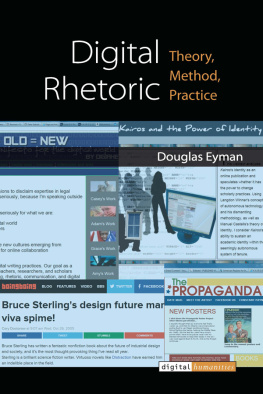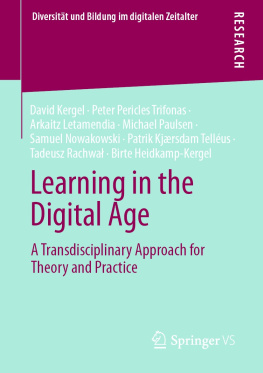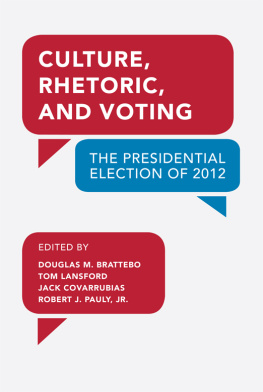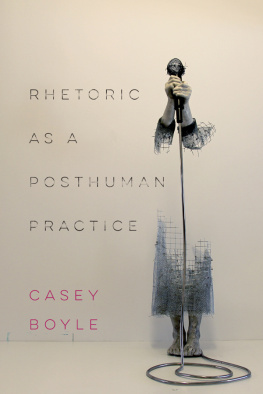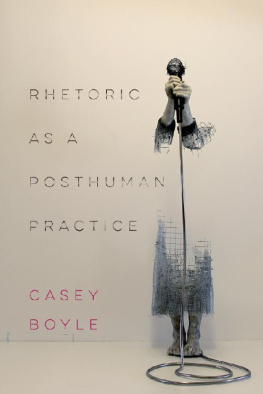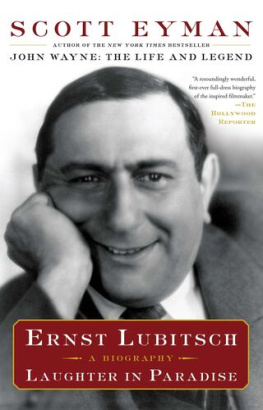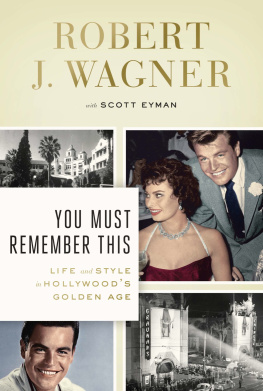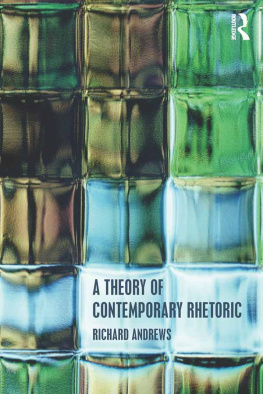Douglas Eyman - Digital Rhetoric: Theory, Method, Practice
Here you can read online Douglas Eyman - Digital Rhetoric: Theory, Method, Practice full text of the book (entire story) in english for free. Download pdf and epub, get meaning, cover and reviews about this ebook. year: 2018, publisher: The University of Michigan Press, genre: Politics. Description of the work, (preface) as well as reviews are available. Best literature library LitArk.com created for fans of good reading and offers a wide selection of genres:
Romance novel
Science fiction
Adventure
Detective
Science
History
Home and family
Prose
Art
Politics
Computer
Non-fiction
Religion
Business
Children
Humor
Choose a favorite category and find really read worthwhile books. Enjoy immersion in the world of imagination, feel the emotions of the characters or learn something new for yourself, make an fascinating discovery.
- Book:Digital Rhetoric: Theory, Method, Practice
- Author:
- Publisher:The University of Michigan Press
- Genre:
- Year:2018
- Rating:3 / 5
- Favourites:Add to favourites
- Your mark:
- 60
- 1
- 2
- 3
- 4
- 5
Digital Rhetoric: Theory, Method, Practice: summary, description and annotation
We offer to read an annotation, description, summary or preface (depends on what the author of the book "Digital Rhetoric: Theory, Method, Practice" wrote himself). If you haven't found the necessary information about the book — write in the comments, we will try to find it.
Digital Rhetoric: Theory, Method, Practice — read online for free the complete book (whole text) full work
Below is the text of the book, divided by pages. System saving the place of the last page read, allows you to conveniently read the book "Digital Rhetoric: Theory, Method, Practice" online for free, without having to search again every time where you left off. Put a bookmark, and you can go to the page where you finished reading at any time.
Font size:
Interval:
Bookmark:
 Page i Page ii
Page i Page ii The Digital Humanities series provides a forum for groundbreaking and benchmark work in digital humanities, lying at the intersections of computers and the disciplines of arts and humanities, library and information science, media and communications studies, and cultural studies.
Series Editors:
Julie Thompson Klein, Wayne State University
Tara McPherson, University of Southern California
Paul Conway, University of Michigan
____________________
Teaching History in the Digital Age
T. Mills Kelly
Hacking the Academy: New Approaches to Scholarship and Teaching from Digital Humanities
Daniel J. Cohen and Tom Scheinfeldt, Editors
Writing History in the Digital Age
Jack Dougherty and Kristen Nawrotzki, Editors
Pastplay: Teaching and Learning History with Technology
Kevin Kee, Editor
Interdisciplining Digital Humanities: Boundary Work in an Emerging Field
Julie Thompson Klein
Digital Rhetoric: Theory, Method, Practice
Douglas Eyman
____________________
DIGITAL CULTUREBOOKS, an imprint of the University of Michigan Press, is dedicated to publishing work in new media studies and the emerging field of digital humanities.
Page iiiDouglas Eyman
University of Michigan Press
ANN ARBOR
Copyright 2015 by Douglas Eyman
Some rights reserved

This work is licensed under the Creative Commons Attribution-Noncommercial-No Derivative Works 3.0 United States License. To view a copy of this license, visit http://creativecommons.org/licenses/by-nc-nd/3.0/ or send a letter to Creative Commons, 171 Second Street, Suite 300, San Francisco, California, 94105, USA.
Published in the United States of America by the
University of Michigan Press
Manufactured in the United States of America Printed on acid-free paper
Printed on acid-free paper
2018 2017 2016 2015 4 3 2 1
A CIP catalog record for this book is available from the British Library.
DOI: http://dx.doi.org/10.3998/dh.13030181.0001.001
Library of Congress Cataloging-in-Publication Data
Eyman, Douglas.
Digital rhetoric : theory, method, practice / Douglas Eyman.
pages cm. (Digital humanities)
Includes bibliographical references and index.
ISBN 978-0-472-07268-2 (hardback) ISBN 978-0-472-05268-4 (paperback) ISBN 978-0-472-12113-7 (e-book)
1. RhetoricData processing. 2. RhetoricStudy and teaching. 3. Digital media. 4. Online authorship. I. Title.
P301.5.D37E96 2015
808.00285dc23
2014048158
Page vThis book would not have been possible without the great hearts and welcoming minds of the computers and writing community, many of whom show up within the text. I wish I could mention everyone who has had an influence on my thinking, my scholarship, my education, but the scope of a work like this is necessarily limited. I especially want to thank those innovators who started Kairos in 1995/96Mick Doherty, Mike Salvo, Greg Siering, Elizabeth Pass, Corey Wick, Jason Teague, and Amy Hanson. I must also thank Michael Day for showing me the ropes at my very first academic conference and introducing me to many of the aforementioned innovators, thus setting me on the path that eventually lead to my becoming the editor and publisher of Kairos, which I believe to be one of the most innovative scholarly journals in any field.
And I could not have done this work if I did not also have excellent colleagues and editors who routinely make sure that Kairos continues to publish innovative digital rhetoric (as) scholarship and that each issue arrives in a timely manner. In particular, I want to single out Cheryl Ball as the true captain of that ship, but all of our editors and team members are critical to the success of the journal.
I am also particularly grateful to my colleagues and mentors at Michigan State Universitys program in rhetoric and writing, many of whom have read and commented on elements of this book in one form or another. There are too many to name you all, but special acknowledgment is due to Malea Powell, Jeff Grabill, Ellen Cushman, Bill Hart-Davidson, Julie Lindquist, Dnielle DeVoss, Dean Rehberger, and Jim Ridolfo. And, of course, my dissertation director, Jim Porter, who provided amazingly rapid and detailed feedback and made sure I finished my PhD in the four years for which I had funding.
Page vi Page vii- Page viii
A common exercise in the first-year composition course is the literacy narrativean autobiographical reflection upon the paths, interests, and practices that led the writer to the very moment of writing the narrative, focusing in particular on reading and writing as the pillars of literacy. A variation on this assignment, first introduced to me by Dickie Selfe (see Kitalong, Bridgeford, Moore, & Selfe, 2003), is the technology literacy narrative, which shifts focus from reading and writing to using and producing digital texts and the ways in which the writer has learned to use the technologies that support those digital literacies. I have chosen to begin this introduction with a version of my own technology literacy narrative, not because I believe that it is particularly unique or enlightening, but because it relates my intellectual development from writing teacher to digital rhetorician and in doing so serves the twin purposes of establishing my ethos as developer of this project and acknowledging that my approach to defining and locating digital rhetoric through the lenses of theory, method, and practice are necessarily both idiosyncratic and rooted in the disciplines through which Ive traveled.
Through my reading and research, I am aware that more than one academic discipline and intellectual tradition can make claims to being the home of digital rhetoric, and Ive worked to make sure that I dont let my own history and bias situate it only in those traditions with which I am most familiar. In fact, I believe that digital rhetoric is an interdisciplinary endeavor that can as easily be situated in departments of communication or English studies and that can be performed within both broad, well-established fields, like media studies, and newer, more narrowly focused approaches such as critical code studies (the relationship between digital rhetoric and these and other disciplines and fields is taken up in , Defining and Locating Digital Rhetoric).
My technology literacy narrative wends its way from the early days of the personal computer, through a detour into using the mainframe systems in college, to writing my first web page and joining a community of scholars whose Page 2 interests and work focused on the intersections of rhetoric, writing, and technology. I will spend some time detailing my work as the editor of an online journal and the ways that my understanding of rhetoric (and digital rhetoric more specifically) were shaped by my doctoral program and the friends and mentors that inhabited it. Each of these elements serves as a building block in the long process that leads me to claim digital rhetoric as both location and scholarly identity. Following this history, Ill touch upon the problem of defining digital rhetoric, address the question of audience for this work, and finally provide an overview of the goals and structure of the project.
Font size:
Interval:
Bookmark:
Similar books «Digital Rhetoric: Theory, Method, Practice»
Look at similar books to Digital Rhetoric: Theory, Method, Practice. We have selected literature similar in name and meaning in the hope of providing readers with more options to find new, interesting, not yet read works.
Discussion, reviews of the book Digital Rhetoric: Theory, Method, Practice and just readers' own opinions. Leave your comments, write what you think about the work, its meaning or the main characters. Specify what exactly you liked and what you didn't like, and why you think so.

